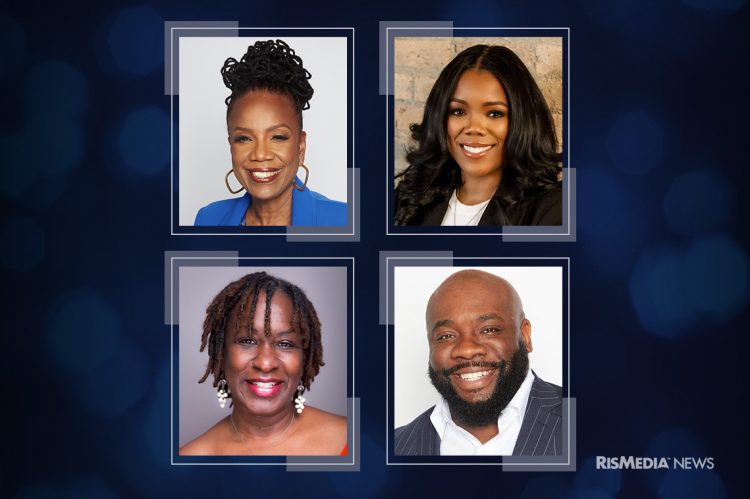Above, top left, team leader Andretta Robinson, with team members, top right Aaqila Harvey, bottom left, Lillie Hagan and bottom right, Bryant Triplett.
As if the residential real estate profession wasn’t competitive enough, Andretta Robinson has had to accept that as a Black woman there were going to be extra challenges, subtle and overt, that she’d need to overcome in order to succeed.
Not only has she done just that, but with her winning personality and non-stop drive, she has also led her team, Chicago’s Titan Group powered by RE/MAX 10, to award after award, as well as outstanding financial achievements. She is laser-focused that team members earn over $100,000 every year, and there have been very few misses.
Born and raised in Montgomery, Alabama, Robinson earned a B.S. degree in business administration and marketing, then worked in the health and beauty industry for 15 years, also owning a spa business. Her love of sales and marketing led her into real estate.
During the pandemic, Robinson obtained a certification in holistic nutrition and started a group called Brown Women Wellness (https://brownwomenwellness.com). Its mission is to empower minority women through education to help them control their health and wellness through a lifestyle of easy and actionable steps.
Here, she shares her inspiring real estate career story, with advice for new agents and more.
Michael Catarevas: How many are on the Titan team?
Andretta Robinson: There are four, including me: Bryant Triplett, Aaqila Harvey and Lillie Hagan.
MC: How long has the team been together?
AR: This is year five.
MC: How did you decide that you wanted to create a team?
AR: My broker at RE/MAX, Val Hatzelis, decided it for me. She said that with the volume of business I was doing, she had some agents who could use my guidance. So she actually gave me my first two team members. The ones now are not all originals.
MC: Were you nervous to start a team?
AR: I was extremely nervous because I had been in corporate America and didn’t want to manage anyone anymore. But she brought me two sharp agents. One of the agents, Bryant Triplett, I had sold a house to when he was like 21. And he told me one day that he was going to retire from what he was doing to work on my team. I looked at him and said, ‘yeah, right.’ But sure enough, he retired from working for the city of Chicago at the ripe old age of 35. Now he’s my top-producing team member.
My daughter, Aaqila Harvey, is also on my team. When she showed interest, I told her to go work for another brokerage first, and sent her to Texas. I wanted her to get experience. So she went there for one year, came back and said she’s ready. And she was.
MC: With Bryant, did you teach him from day one?
AR: I did. Bryant not only had the personality, he had that go-get-it attitude, the same one I had. He eats, sleeps and drinks real estate. But in his first year, he went through struggles like everybody else. I told him that in my first year in real estate I made $16,000, and that your first year is like going to real estate university. You’re getting paid a little bit because you’re learning. I told him not to have any expectations. I just wanted him to soak it all in and develop good habits. That’s what I stress to my team…develop good habits. If you don’t, you’re not going to be a good REALTOR®.
MC: What are some of the key habits new agents need to establish?
AR: Even though you’re working for yourself, you have to have a schedule. Block out time in terms of when you’re going to prospect, when you’re going to make phone calls, when you’re going to show houses, when you’re going to make listing appointments, when you’re going to do administration. Even block time for your family.
MC: Talk about your unique marketing idea.
AR: We created a marketing campaign called Titan Thursday Group. It’s once a month. We pick a local coffee house and send invites to past clients and new clients. We talk about different subjects regarding real estate.
MC: You are in the Chicago market. Where specifically?
AR: We cover primarily everything south of the Chicago Loop, which is Chicago’s downtown, and then into the south suburbs, which is a pretty big area. Our market is predominantly African American. I’m also licensed in Indiana, so I cover some of northwest Indiana.
MC: Please describe your experience leading a Black REALTOR® team.
AR: There are not a lot of Black teams. Our average home sale price is usually going to be less than our counterparts because we’re working with a lot of first-time buyers who have no insight. They’re unprepared. So we’re getting a chance to give homeownership to a lot of people who are first-generation college graduates. And some of them are the first ones to purchase a home in their family.
They come with little financial real estate literacy as opposed to our counterparts, who a lot of times have parents of their clients to help the buyer. Parents give them wisdom because they have experienced buying homes, often more than one, so they know what it takes. We will not take a homebuyer to a house unless we have a virtual consultation that takes about two and a half hours.
We do that because we have to go over everything from A to Z. It’s a lot more work. And it makes it harder for us to hit our numbers. People are surprised when we go up on stage during RE/MAX awards and ceremonies. We’re the only Black team ever to go up there. And they’re always surprised that we hit our numbers. By now we must have 25 awards, and I won the lifetime achievement award.
MC: What are some of the challenges you face as a Black female REALTOR®?
AR: I’m originally from the South, but have been living in Chicago for 36 years, so I’m a Chicagoan now. I’ve lived here as long as I’ve lived anywhere, but my roots are in Alabama. I think that perspective helped me. I have tried and worked hard not to have trust issues. I opened myself up to not think about whether I’m going to trust this bank, or trust this lender, or trust this real estate agent, that they might not be telling me the correct information. I try to not have those attitudes. Me and my team make sure to conduct ourselves very professionally.
MC: Have you had to deal with racism, subtly or overtly, in your real estate career?
AR: Yes. When we go past certain neighborhood lines and go into areas that are predominantly white, especially on listing appointments, it’s a fight. It’s a fight to get that listing. It’s very difficult to get a white listing in a white area if you’re a Black agent. I don’t care what anyone says. But if you have a white seller moving from a Black area, they want a Black agent, because they know the buyer is probably going to be Black.
Something once happened in a Black neighborhood that used to be predominantly white. The seller had gone through two white agents before he got to me, and couldn’t sell the home. He thought too highly of it, like most sellers do. Finally after two agents failed he called me, and I met with him. What came out of his mouth almost caused me to turn him down as a client.
As we were going through my listing presentation, he said that ‘the price I should be getting, I’m not getting because we waited too long. We watched the white flight and waited, so I’m unable now to get the price I want for my house.’
And I just said, ‘okay, let’s see if we can get this price.’ Of course the price he wanted was not going to be the price he was going to get. The house was dated. Black people like updated houses like everybody else.
MC: Do Black buyers face unique challenges as well?
AR: Yes. When Blacks get ready to move out of predominantly Black communities and into a white community, they find that they have to pay a higher price for the home because they’re going into a better school district. The school districts are not as good in the Black areas. That’s why the prices are lower. But the taxes there are higher.
MC: Is it rewarding to sell houses to people who are first-time buyers in their families?
AR: Yes. It is very, very, very rewarding. And normally when I get those people as clients, I’m going to get their sister and everybody else after that. It’s starting to change some now because you’re getting more educated first-timers. A lot of the Gen Zs and millennials are second-generation college graduates.
MC: What strategies or tips can you share for managing a team?
AR: Communication and setting up and making sure you have standard operating procedures. When I hire a team member, I don’t just hire them and say, ‘Oh, now you’re a team member.’ We take them through standard operating procedures on how we want them to conduct themselves. If you don’t have standard operating procedure protocols, then you’re out there all willy-nilly.
MC: Is attitude a major factor?
AR: Yes. In the beginning, my team didn’t work out because I didn’t want a team. I was told to take on a team. So I was a little resistant, and in the first couple of years I lost a couple of team members because of it.
MC: Have you seen a big difference in your business over the last couple of years?
AR: Absolutely. And this year it’s been a struggle a little bit. I saw it coming. I remember saying we have to put our heads down and really get into our marketing and prospecting. We didn’t have time to prospect a few years ago. And you get spoiled very quickly. But now it’s definitely changed. We’ll see how this year ends up.

For more information, visit https://www.remax.com/real-estate-agents/andretta-robinson-oak-lawn-il/100039594.












